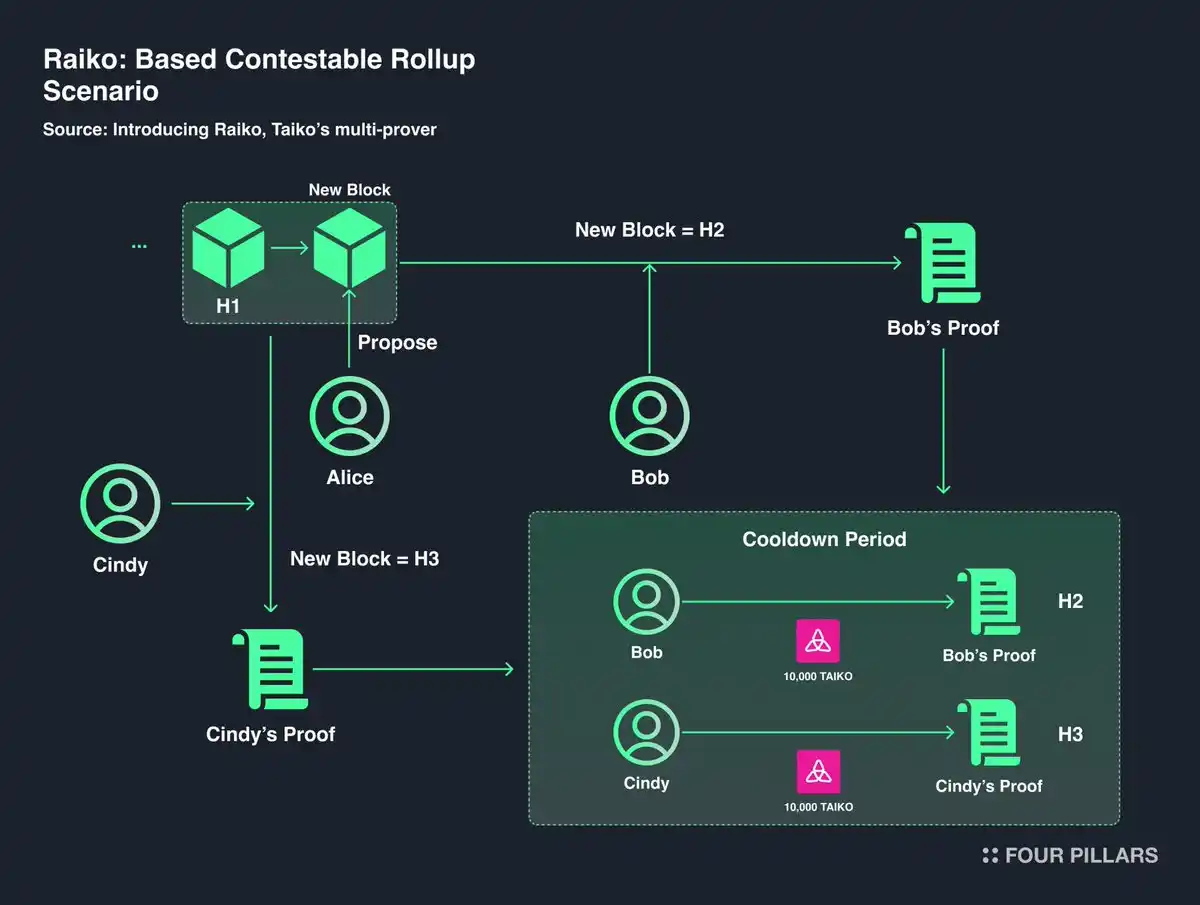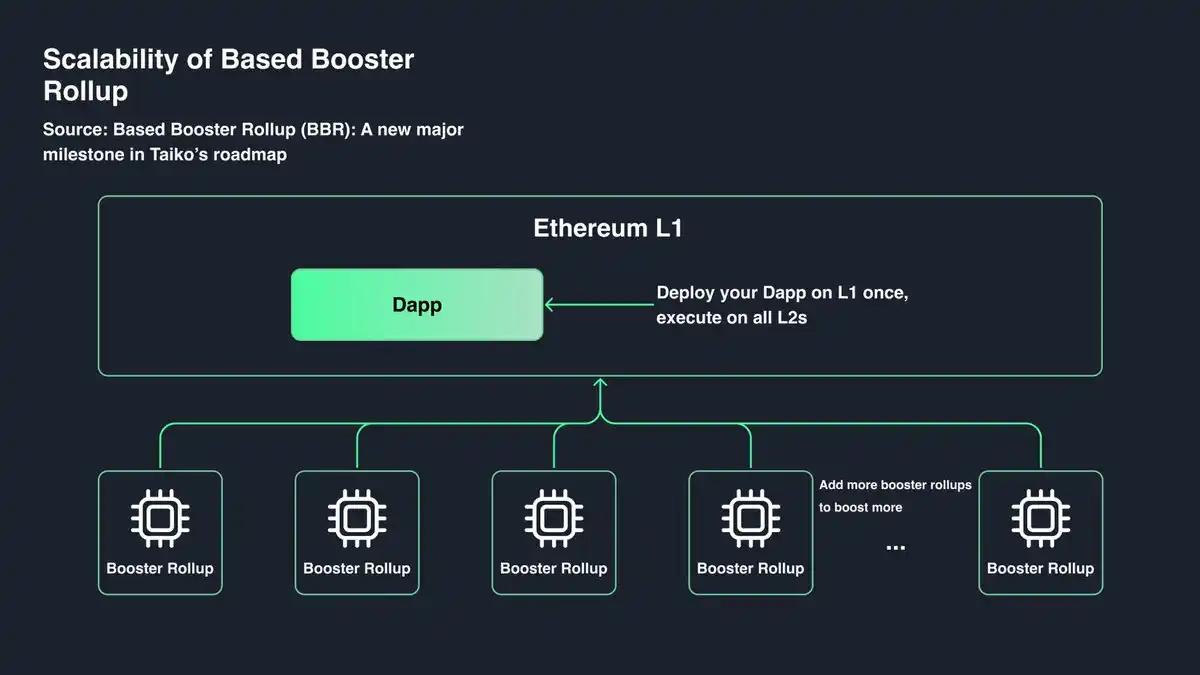Original author: @xparadigms and @IngsParty
Original title: "Decentralizing Rollups: A Neglected Priority in Rollups"
Original translation: weizhi, BlockBeats
Decentralization is one of the core values of blockchain. However, in order to improve the scalability of Ethereum, the Rollup solution sacrifices some decentralization in operation. Achieving complete decentralization in these operations still faces challenges in sorting and proof settlement, especially for optimistic Rollup and zero-knowledge (zk) Rollup.
Despite these challenges, the development of decentralized Rollup is accelerating. Some optimistic Rollups have introduced permissionless challenge mechanisms and are testing hybrid proof systems. The Taiko project stands out for its clear roadmap for decentralization. Let's delve into the reasons.
1. Background - Core Components: BCR and BBR
Taiko's "Decentralizing Rollup Road" introduces two proof systems and frameworks: Competitive Rollup (BCR) and Booster-based Rollup (BBR).
1.1 Competitive Rollup (BCR) - Powerful L2 Proof System
BCR is a Rollup design that includes a competitive mechanism. This design verifies transactions by allowing participants to challenge the validity of transactions when fraud is suspected. This mechanism enhances decentralization by allowing Ethereum validators to use challenge mechanisms for transaction sorting without a central sequencer, thereby maintaining the integrity of the blockchain.
The BCR mechanism combines the advantages of Ethereum transaction sorting with challenge functionality, aiming to reduce transaction costs while maintaining security and decentralization. In addition, Taiko adopts multiple proof systems within BCR, including SGX, ZK, SGX + ZK, and other stages of Rollup proof systems, ensuring the flexibility and more stable operation of the system.
Despite these advantages, BCR's design also has a potential drawback: when competition frequency is low, validators may lack activity. The structure of validators requires a significant amount of competition to be profitable, so in environments with less competition, they may be less inclined to participate. To address this issue, Taiko implements dynamic adjustments to different Rollup proof systems to solve this problem.

1.2 Booster-based Rollup (BBR)
BBR aims to scale Ethereum DApps without redeploying on all L2 solutions. It reduces the workload for developers and lowers redeployment costs by sharding transaction execution and storage. This design aims to address the fragmentation of liquidity between L2 and enhance network scalability.
In November 2023, Taiko launched the Gwyneth booster Rollup plan to enhance Ethereum's capabilities. Gwyneth uses Ethereum L1 validators for transaction sorting and L1 builders for block construction. Its main features include synchronous composition for seamless L1 integration, scalability to meet growing demands, and the ability to pre-confirm fast transactions.

Gwyneth was "terminated" from the beginning, with its security guaranteed by Taiko's multi-proof system Raiko and using trusted execution environments (TEE), with plans to introduce zkVM in the future. Both BCR and BBR are part of Taiko's efficient scaling solutions for Ethereum, ensuring the handling of high transaction volumes while maintaining security and decentralization.
2. Key Points
2.1 "Have We Considered Decentralization in Rollup?"
FourPillars researcher Heechang believes that currently, most Rollups are still centralized. Decentralized sorting and proof systems are still in progress. Two well-known proof systems, optimistic Rollup and zero-knowledge Rollup, are moving towards decentralization.
Optimistic proof systems: These systems have implemented mandatory L1 transactions and are exploring shared sorting and introducing permissionless challengers. Arbitrum and Optimism allow permissionless challenges, but recently, due to suspicious vulnerabilities, Optimism has banned this mechanism.
Zero-knowledge proof systems: Most zero-knowledge Rollups do not allow mandatory transactions on L1. Although zero-knowledge proofs provide secure state change guarantees, operations are currently centralized, and technical challenges remain significant.
Although not fully decentralized at present, Rollup frameworks such as OP-Stack, ZK-Stack, PolygonzkEVM, and ArbitrumOrbit have been adopted by hundreds of L2 projects. This trend continues, and Rollup framework teams are working hard to achieve decentralization. However, not all projects have a clear roadmap to address decentralization challenges.
In this regard, Taiko stands out. From its inception, it has had a clear roadmap with the goal of becoming an L2 and decentralized Rollup framework. It has a clear path forward and operates token economics to provide sustainable utility for its L2 tokens, which most other projects lack.
As other projects also improve their codebase and infrastructure, whether Taiko can successfully realize its vision at the right market timing remains to be seen. As one of the teams closely collaborating with the Ethereum Foundation, Taiko especially needs to focus on its progress in decentralization.
2.2 "It's Time to Consider Decentralization of Rollup"
FourPillars researcher IngeunKim believes that currently, major Rollup projects are striving for decentralization. However, no project has made significant progress in achieving complete decentralization. The main reason is that the priority of decentralization was low in the initial design stages of today's mainstream Rollups. These Rollups initially focused on performance and functionality, and now integrating the concept of decentralization into their rigorous designs is extremely difficult. This is understandable, as in the early stages, Rollups needed to deliver efficient performance results while meeting Ethereum's scalability needs.
However, the concept of decentralization in Rollups is becoming increasingly important. This is similar to the transition from a performance-driven Web2 era to a decentralized Web3 era. Fortunately, many Rollup projects have laid the foundation for decentralization, paving the way for the future. In this context, Taiko's attempts in decentralized Rollup are worth positive attention, especially its Competitive Rollup (BCR) mechanism, which includes the basic elements for achieving complete decentralization, such as allowing anyone to participate, and fair rewards and penalties.
Of course, there are many areas that need improvement, and the path to complete decentralization is challenging. However, Taiko's efforts are considered highly important and may have a positive impact on the entire Ethereum L2 ecosystem. Their progress is definitely worth paying attention to.
3. Other Perspectives
3.1 "Choice is Not Just a Technical Issue, It's Also About Decentralization"
Taiko member Junger stated that with the popularity of Rollup, fragmentation and isolation have become key issues. There is a trade-off between choosing between Rollup-based and shared sorting layers. Shared sequencers provide fast finality and cross-chain composability, but introduce new trust assumptions and potential failure points. Rollup-based solutions leverage Ethereum's infrastructure, providing liquidity and L1 composability, but face challenges with block time and throughput.
Future improvements may include pre-confirmation-based and faster L1 block times to enhance user experience while staying aligned with Ethereum. The goal is to build a scalable and truly decentralized ecosystem that aligns with the vision of Ethereum.
Junger emphasized that the choice of developing based on Rollup is not just a technical decision, but about the direction of decentralized Rollup "frameworks."
3.2 "The Endgame is Based on Rollup"
Justin Drake, a researcher at the Ethereum Foundation, has been actively involved in discussions about Ethereum's scaling solutions, particularly focusing on Rollup-based solutions and the Taiko project. Drake emphasized the importance of decentralized sorting, which can mitigate issues of monopolistic control and censorship in transaction sorting. He believes that integrating technologies such as zero-knowledge proofs and shared sequencers can enhance the functionality and security of Rollup-based solutions.
Justin Drake sees Taiko as an important step towards achieving a decentralized and scalable Ethereum ecosystem, with its mainnet's permissionless sorting and proof systems being a significant feature. He also stated that "the endgame is based on Rollup."
免责声明:本文章仅代表作者个人观点,不代表本平台的立场和观点。本文章仅供信息分享,不构成对任何人的任何投资建议。用户与作者之间的任何争议,与本平台无关。如网页中刊载的文章或图片涉及侵权,请提供相关的权利证明和身份证明发送邮件到support@aicoin.com,本平台相关工作人员将会进行核查。



